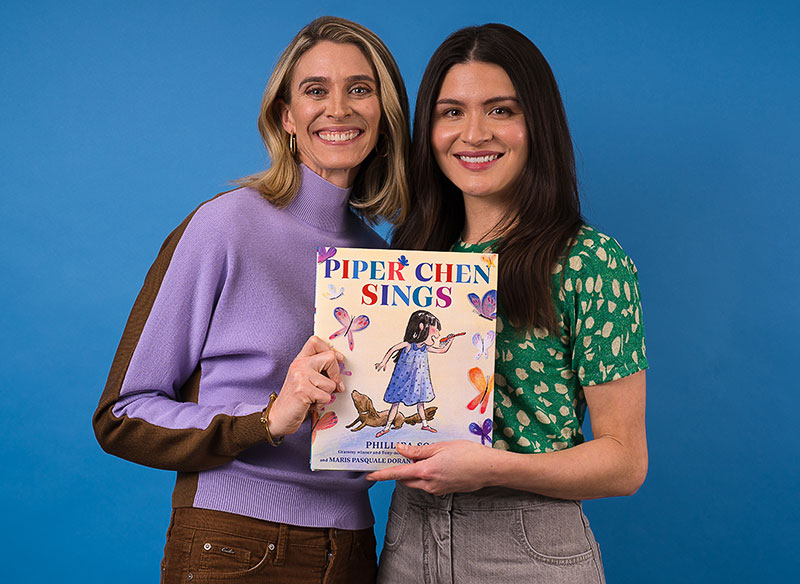Phillipa Soo
By Jen Banowetz
June 2024 View more Spotlight
This Broadway star helps kids tackle stage fright with her new book

You might know Phillipa Soo for originating the role of Eliza Hamilton in that little musical a few years back called Hamilton. Other iconic Broadway roles soon followed, including Cinderella in Into the Woods and Guenevere in Camelot. Now the Libertyville native can add children’s book author to her Playbill bio.
Cowritten with Soo’s sister-in-law Maris Pasquale Doran, Piper Chen Sings debuted this spring and tells the story of how a little girl learns to tame her stage-fright butterflies. (Piper bears a little more than a passing resemblance to Soo.) The idea for the book was sparked by a conversation back in 2018 between Soo and Doran, a psychotherapist and mom to two boys.
“We were at a family gathering around the holidays,” Soo recalls. “We both had a passion for children’s literature. I always wanted to write one; she was clearly interested in writing one, so we said, ‘Let’s try to write one together.’ We had an amazing time working together.”
Soo recently chatted with us about her new role as author.
Q: Tell us about the idea for the book?
A: Coming out of the Hamilton experience, I was surprised how many young people seemed to really be inspired by our story. I had been doing a lot of interviews where a lot of the times the question was asked, “What would you tell your younger self?” Another question I was asked a lot was, “What do you do when you get nervous?” This book is kind of the answer to that. I grew up having horrible stage fright, butterflies, before going onstage. Writing with Maris, who has expertise in this field, it really became a book that was an extension of both of us. A book that is indeed about overcoming stage fright and finding a way to be brave in a moment of feeling anxiety, but it’s also a book about feelings and how to hold two seemingly opposing feelings at one time. For Maris and I, we were very delicate and specific about how we wanted to convey that message on how to deal with your butterflies—these anxious feelings that come out of excitement but also a little bit of dread—the ability for a young person to first of all just acknowledge their feelings and knowing they have a choice, a choice of how they can deal with those feelings once they’ve acknowledged them. Hopefully, by way of doing that they feel empowered. That’s essentially where we landed, and it just started as a conversation.
Q: How autobiographical is the story?
A: Piper is definitely inspired by a younger version of myself. The pitch originally was that she was my mini avatar, but she is in her own right her own character. We very much wanted to make sure that it’s not directly biographical though it is inspired by my life. I had a nai nai [grandmother] who played the piano, but this nai nai is definitely different from my own nai nai for purposes of telling this original story. It’s very reminiscent of how I grew up, especially culturally, being part of a household where you’re learning new words in a different language. And that’s specific to Piper, having a grandparent who was an immigrant.
Q: How did you overcome your own stage fright?
A: I have a practice of gratitude before going on stage—that this is so much bigger than me going out and showing the world what I can do—this is about a project, a piece of a whole that I can go out and contribute something that might be impactful to at least one audience member out there—that’s my goal—to reach somebody. So, coming at it from a perspective of feeling gratitude for that honor to be able to tell stories for a living, it makes it less scary. It actually makes it feel exciting and that there’s a purpose to what I’m doing.
Q: Any advice for young people?
A: Continue to expose yourself to different forms of art. It’s just really important to understand what you like, what you like to make, what you like to see, exposing yourself to new stories, new ways of thinking, and to really be your own teacher—that you can feel empowered to do that for yourself. That curiosity is not something that has to be given to you, that you have to ask permission for. You can just go out and explore the world and be your own teacher.
Photo: Charlotte Lesnick


